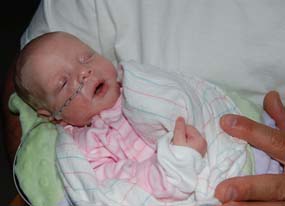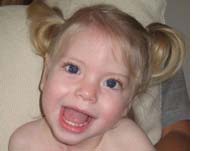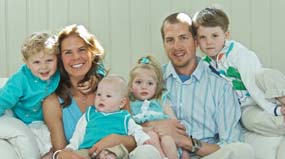
On May 22, 2006, Katie and Peter Jackson welcomed their third child – and first daughter – into the world. Anya Marie was a healthy 7 pounds and instantly became the family’s “little princess.”
As relatives took turns holding the newest member of their family, Anya’s grandma noticed a gurgling sound coming from the newborn. That sound would prove to be the beginning of an ordeal the Jacksons had never imagined.
“I was holding this perfect, beautiful baby and I heard a gurgling noise,” said Sandy Greenheck-Gumness, Anya’s  grandmother. “I told the nurse and they said they’d check it out, and the next morning my tiny granddaughter was hooked up to a bunch of monitors.”
grandmother. “I told the nurse and they said they’d check it out, and the next morning my tiny granddaughter was hooked up to a bunch of monitors.”
Anya had normal results from her Apgar tests, which are evaluations of a baby’s health after birth, but later that evening she started having mild apnea spells when feeding. She was unable to coordinate a consistent swallow reflex leading doctors to begin a series of tests.
Born at a smaller community hospital in Colorado, Anya ultimately had to be transferred to a larger hospital equipped to handle critically ill newborns. The 45-minute trip was a horrifying experience for Anya’s family.
“They got her prepped to be transferred and they loaded our tiny baby onto this cart, all hooked up to monitors and IVs with tubes in her nose,” Greenheck-Gumness said. “I’ll never forget the look of despair on her mom’s face.”
Anya, whose name has become an acronym for Angels Near You Always, ended up spending nearly three weeks in the Newborn Intensive Care Unit (NICU) undergoing multiple surgeries, countless blood tests, a spinal-tap, MRI and CAT scans and multiple X-rays. Each day of intensive care brought a plethora of specialists and a gamut of tests, but no answers.
 Throughout the seemingly ever-lasting and painful experience, Anya’s parents never left her side. They are forever thankful they were able to stay in the NICU with their daughter.
Throughout the seemingly ever-lasting and painful experience, Anya’s parents never left her side. They are forever thankful they were able to stay in the NICU with their daughter.
“Everything that could have gone wrong, did go wrong,” said Greenheck-Gumness. “There seemed to be a lot of confusion with all the different specialists coming in and out – not to mention three different hospitals and dozens of different medical protocols and systems to navigate.”
Anya’s parents and family network were left with little direction to meet this incredible life-changing challenge. However, they were resolute in their support of Baby Anya, and remain so to this day.
Anya’s challenge helps other critically ill babies survive
Despite Anya’s numerous health-related issues, her spirit and will to live became a touchstone for helping other families in similar situations.
Sandy and her husband Brian Gumness, Executive Director of the B.A. & Esther Greenheck Foundation, met with Aspirus Wausau Hospital administration to tell Anya’s story. At about the same time, the hospital was opening the only NICU in the greater Wausau area.
|

Easter 2009: The Jackson family, from left, Aksel, Katie, Bodie, Anya, Pete and Anders.
|
The Gumness family has followed the progress of Aspirus NICU ever since.
In 2008, the Aspirus Women’s Golf Classic benefited the NICU, and funds were used to purchase two Giraffe Beds for the NICU. These isolettes are designed to keep critical newborns in an environment that advances their development and reduces stress for maximum healing.
Because of Anya’s experience, the Board of Directors of the B.A. & Esther Greenheck Foundation understood the importance of having a state-of-the-art NICU in a community like Wausau. They made a decision to fund a second Giraffe Bed with a grant of $50,000, and they also pledged $300,000 to Aspirus for the NICU expansion project.
Meeting A Great Need
In recent years, the need for specialized care for critically ill newborns has steadily grown in the region. To meet this need, Aspirus Wausau Hospital expanded its previous 4-bed NICU into a 12-bed, single-room care model that can support up to 14 babies (including multiples).

Anya’s parents, along with the B.A. & Esther Greenheck Foundation have graciously donated their time and personal experience to help hospital designers keep the Aspirus NICU the premier place to care for our most vulnerable patients.
Having such a unique NICU in the community benefits the entire region, minimizing stress on babies and helps keep their families close to home. It is be the only single-room care model in north and central Wisconsin with neonatal specialists who work 24 hours a day, seven days a week to give individualized care to these high-risk newborns.
“We don’t know if having a comprehensive NICU in the hospital Anya was born would have made any difference in the way things turned out for our granddaughter, but before this family experience, we never understood how important having a community based NICU can be,” said Greenheck-Gumness. “It is such a blessing to have a premier NICU here in Wausau.”